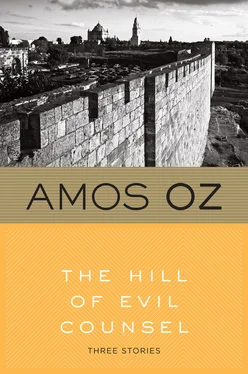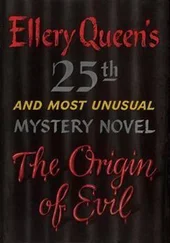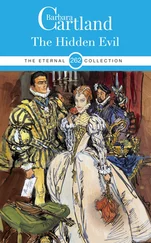When she was gone I emerged.
"What's going to happen, please, Mr. Nehamkin?"
"We shall continue to suffer and to wait, Uriel. I am very sorry for us all. Eyes have we but we see not. To outward appearances we are fearlessly made, but in truth we are consumed by our afflictions. From now on, my boy, we shall redouble our vigilance, you and I: the versifier and the youth shall hold the fort and guard the truth. Do not weep, young Uriel; surely we have shed tears enough already in our long years of exile."
Ephraim woke up toward evening. He thrust his curly head under the faucet and returned, dripping and silent, to his work. He lit a cigarette with wet hands. He did not utter a word. For an hour and a half or so, until Mother came out onto the balcony to call me home, I sat on the floor in my gym shorts and "Young Maccabeans" T-shirt, with my hands clasped around my knees, and watched him dismantle and reassemble a complicated switchboard full of knobs, switches, and buttons. Ephraim was doggedly silent. I did not interrupt him. Once he looked up, chuckled sourly at the sight of me, and said with surprise:
"You still here?"
I smiled at him. I wanted to be big and helpful, but at the same time I wanted to stay little so that he would go on loving me. I was afraid to tell Ephraim how we watched over him while he slept, and how we had driven Esther and Ruhama away from the house. I was ashamed at the thought of how Ruhama and I had made each other miserable to the point of tears, and how we had almost broken down and cried together.
Ephraim said:
"We're making progress, despite everything."
"But when will we be able to start?" I asked.
He stood up and bent over me and cupped my head roughly in his hands; his lips touched my forehead and my cheeks and he could see close up where I had lost one of my front teeth and maybe even the new one that was beginning to grow there.
"Be patient, Uri. The fire will break out at the proper moment, all over the country at once. We're making progress, despite everything."
7
At half past five one Friday afternoon, when the white-hot light was beginning to fade and a different, more passive light was descending on the lane, a curfew was imposed and house-to-house searches began.
The wistfulness of Sabbath Eve, the hesitant rustle of the breeze in the leaves, which the poet was forever trying to decipher in his verses, the uneasy marriage of tin and stone, the closing in of the slowly moving mountains all around, the scents of Sabbath, had all been crudely shattered. Police cars with loudspeakers dispelled the silence of the streets. A metallic voice warned the populace in Hebrew and English that the searches might continue all night. No one was to go outside. Not even onto the balconies. Obey orders. No hoarding. Cooperate. Anyone found out of doors would be risking his own life. We were hereby warned.
As soon as the car had vanished and the metallic voice faded away to other streets, Helena Grill rushed onto her balcony and tried to muster her children. She stood, disheveled and frantic, among the tubs of cactus and asparagus fern, cursing her children and her husband, sobbing in Yiddish, and when she caught sight of me crossing the yard, she called after me, "Idiot!"
Other neighbors went running to the grocer's, which had reopened, to snatch up eggs, milk, canned food, and bread. There were some who feared that the curfew would last for several days. Others repeated various rumors.
Still, this was by no means the first time. In those days, the authorities were in the habit of suddenly cordoning off one district or another and searching the houses for Underground cells or illegal arms.
At the sound of Helena Grill's shouts, Father hurried out of the kitchen, where he had been meticulously dicing onions. He took off Mother's apron, which he had been wearing, carefully folded it, and put it away. He wiped his brow with the back of his hand and went downstairs into the yard. Extracting the Grill boys one by one from the disused garden shed, he dispatched them to their home. Then he shut himself up for a while with his printing press in the basement. Eventually he came back upstairs, smelling of onions and printer's ink. He washed his hands and face and started to chew his mint leaves. His eyes were still streaming from the onions as he assured Mother that we had nothing to worry about. They wouldn't find anything, even if they dismantled the printing press down to its last screw.
"You're sure," Mother said. Father inquired whether this was a question, a compliment, or a complaint.
"I'm not sure," Mother replied, and Father responded politely:
"Of course."
I knew perfectly well that Father was right: we had nothing to worry about. They would never find the subversive leaflets, which had originated with Ephraim, then been put into prophetic language by Mr. Nehamkin, and finally printed on yellow paper by Father and his two assistants. Nor would they find my box, which was hidden behind the loose stone, because I had wrapped it in a silk stocking stuffed with sawdust sprinkled with crushed garlic to baffle the bloodhounds.
They were bound to fail: after all, we were the righteous few, and they were the tyrants.
It was six o'clock in the evening when the neighborhood was sealed off. The streets were deserted. Armored cars converged on us from three directions and drew up arrogantly, perpendicular to the road, with two wheels on the sidewalk. Machine guns were trained on our windows and rooftops. Gleaming brass ammunition belts hung down from the guns. There was even a light gun mounted on a carriage, stationed halfway down Zephaniah Street, pointing toward the glimmering mountains, as if it were from the mountains that the legions of the Underground would emerge to burst into Jerusalem.
Four truckloads of troops arrived from the Schneller Barracks. From the living-room window I watched the soldiers jump down and fan out at a run along the garden walls, covering one another as they went. Each soldier was armed with a submachine gun and a commando knife in a black sheath, and equipped with a rectangular haversack, a water bottle, and ammunition pouches; they were wearing gaiters. Despite all this, those British troops did not look in the least like the soldiers in the pictures. Most of them looked etiolated; the Judean sun that bronzed us was not kind to them.
The soldier who stationed himself outside our gate reminded me, despite his uniform and kit, of the shy young cashier in the Chancellor Road branch of the Anglo-Palestine Bank. He was smiling timidly, tucking his shirt into the top of his shorts, and suddenly started to pick his nose furiously; apparently it never occurred to him that he might be under observation.
I felt sorry for him. And for the Underground fighters who had to be in hiding. I felt sorry for my mother. For Mr. Nehamkin, who was lying alone in his bed suffering from a bad attack of summer flu. And for Ephraim, who had vanished hurriedly on his wanderings as soon as the curfew was announced, to meet his fate in some Godforsaken place where the hyena might be lurking. I even felt sorry for Helena Grill, although she had called me an idiot for no reason at all. There was nothing but sorrow as far as the eye could see. The refugees who were being turned away daily from the shores of our country and being sent off to desert islands like Zanzibar or Mauritius. Bloodthirsty gangs were prowling in the villages. Maybe Jerusalem and the Promised Land of the Bible were not here after all, but in some other corner of the earth; surely in the course of thousands of years some mistake might have arisen. And it was there that the rose of Sharon and the lily of the valley bloomed, and there that rest and peace were to be found. Maybe the Hebrew state had already been established there, and only we had been forgotten among these mountains. For a moment I longed to pardon all the foes of Israel, to forgive them everything; the Maccabees would never live again, the lions had eaten Bar Kochba, Eleazar the Hasmonean had been crushed by an elephant, and Josef Trumpeldor had been murdered by brigands. Enough. How much longer would Ruhama sit and shrivel in the sun on the workshop steps, and how much longer would we have to drive her away?
Читать дальше











